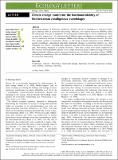Files in this item
Climate change transforms the functional identity of Mediterranean coralligenous assemblages
Item metadata
| dc.contributor.author | Gómez-Gras, Daniel | |
| dc.contributor.author | Linares, Cristina | |
| dc.contributor.author | Dornelas, Maria | |
| dc.contributor.author | Madin, Joshua S. | |
| dc.contributor.author | Brambilla, Viviana | |
| dc.contributor.author | Ledoux, Jean-Baptiste | |
| dc.contributor.author | López-Sendino, Paula | |
| dc.contributor.author | Bensoussan, Nathaniel | |
| dc.contributor.author | Garrabou, Joaquim | |
| dc.date.accessioned | 2021-03-17T12:30:11Z | |
| dc.date.available | 2021-03-17T12:30:11Z | |
| dc.date.issued | 2021-05 | |
| dc.identifier | 273371163 | |
| dc.identifier | 46d3c7cd-899a-45e8-830f-5d2a803c807b | |
| dc.identifier | 85102683994 | |
| dc.identifier | 000629443900001 | |
| dc.identifier.citation | Gómez-Gras , D , Linares , C , Dornelas , M , Madin , J S , Brambilla , V , Ledoux , J-B , López-Sendino , P , Bensoussan , N & Garrabou , J 2021 , ' Climate change transforms the functional identity of Mediterranean coralligenous assemblages ' , Ecology Letters , vol. 24 , no. 5 , pp. 1038-1051 . https://doi.org/10.1111/ele.13718 | en |
| dc.identifier.issn | 1461-023X | |
| dc.identifier.other | RIS: urn:F804ABA41C194DEDAA8A6F5B5850A6BC | |
| dc.identifier.uri | https://hdl.handle.net/10023/21643 | |
| dc.description | We acknowledge the funding of the Spanish government through the ‘Severo Ochoa Centre of Excellence’ accreditation (CEX2019‐000928‐S). This research has also been partially funded by the HEATMED project (RTI2018‐095346‐B‐I00, MCIU/AEI/FEDER, UE), Interreg Med Programme (Projects MPA‐ENGAGE; 5216 | 5MED18_3.2_M23_007 and MPA‐Adapt, 1MED15_3.2_M2_337) 85% cofunded by the European Regional Development Fund, the MIMOSA project funded by the Foundation Prince Albert II Monaco, the Perfect project funded by the TOTAL Foundation, the Medchange project funded by the Agence Nationale pour la Recherche (ANR) and the European Union's Horizon 2020 research and innovation programme under grants agreements 689518 (MERCES) and SEP‐210597628 (FutureMARES). D.G.G. is supported by an FPU grant (FPU15/05457) from the Spanish Ministry of Education. CL gratefully acknowledges the financial support by ICREA under the ICREA Academia programme. VB is supported by the Templeton Foundation (grant #60501, ‘Putting the Extended Evolutionary Synthesis to the Test’). J‐B.L is supported by the strategic Funding UIDB/04423/2020 and UIDP/04423/2020. We thank M. Zabala, J.M Gili and A. Santín for their valuable help in trait definition. D.G.G, C.L, J‐B.L, N.B, P.L.S & J.G are part of the Marine Conservation research group (www.medrecover.org) (2017 SGR 1521) from the Generalitat de Catalunya. | en |
| dc.description.abstract | Quantifying changes in functional community structure driven by disturbance is critical to anticipate potential shifts in ecosystem functioning. However, how marine heatwaves (MHWs) affect the functional structure of temperate coral-dominated communities is poorly understood. Here, we used five long-term (> 10 years) records of Mediterranean coralligenous assemblages in a multi-taxa, trait-based analysis to investigate MHW-driven changes in functional structure. We show that, despite stability in functional richness (i.e. the range of species functional traits), MHW-impacted assemblages experienced long-term directional changes in functional identity (i.e. their dominant trait values). Declining traits included large sizes, long lifespans, arborescent morphologies, filter-feeding strategies or calcified skeletons. These traits, which were mostly supported by few sensitive and irreplaceable species from a single functional group (habitat-forming octocorals), disproportionally influence certain ecosystem functions (e.g. 3D-habitat provision). Hence, MHWs are leading to assemblages that are deficient in key functional traits, with likely consequences for the ecosystem functioning. | |
| dc.format.extent | 14 | |
| dc.format.extent | 7338126 | |
| dc.language.iso | eng | |
| dc.relation.ispartof | Ecology Letters | en |
| dc.subject | Community structure | en |
| dc.subject | Disturbance | en |
| dc.subject | Functional change | en |
| dc.subject | Functional diversity | en |
| dc.subject | Functional ecology | en |
| dc.subject | Reefs | en |
| dc.subject | Stability | en |
| dc.subject | Temperate | en |
| dc.subject | Warming | en |
| dc.subject | GE Environmental Sciences | en |
| dc.subject | QH301 Biology | en |
| dc.subject | DAS | en |
| dc.subject | SDG 13 - Climate Action | en |
| dc.subject | SDG 14 - Life Below Water | en |
| dc.subject.lcc | GE | en |
| dc.subject.lcc | QH301 | en |
| dc.title | Climate change transforms the functional identity of Mediterranean coralligenous assemblages | en |
| dc.type | Journal item | en |
| dc.contributor.institution | University of St Andrews. School of Biology | en |
| dc.contributor.institution | University of St Andrews. Centre for Biological Diversity | en |
| dc.contributor.institution | University of St Andrews. Fish Behaviour and Biodiversity Research Group | en |
| dc.contributor.institution | University of St Andrews. Marine Alliance for Science & Technology Scotland | en |
| dc.identifier.doi | https://doi.org/10.1111/ele.13718 | |
| dc.description.status | Peer reviewed | en |
This item appears in the following Collection(s)
Items in the St Andrews Research Repository are protected by copyright, with all rights reserved, unless otherwise indicated.

